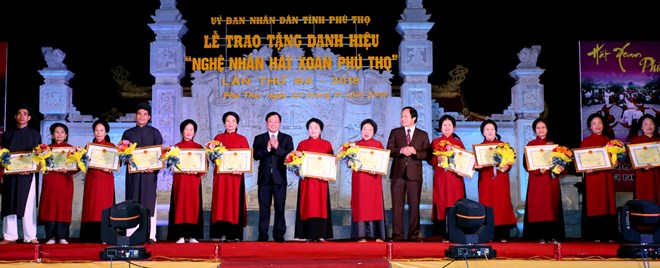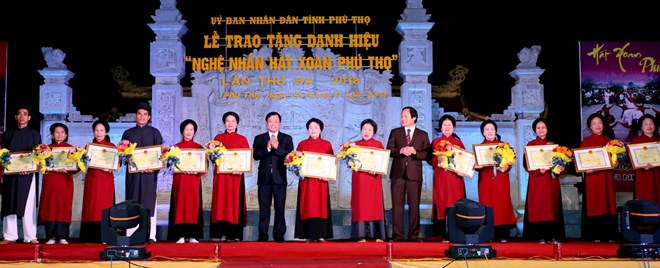
Additional 14 people in the northern province of Phu Tho have been presented with the "Xoan singing artisan” title in recognition of their contributions to preserving and promoting the value of the UNESCO-recognised intangible cultural heritage.

Phu Tho has additional 14 Xoan singing artisans (Source:
phutho.gov.vn)
Speaking at a ceremony on November 23, Vice Chairman of the
provincial People’s Committee Ho Dai Dung said that the 14 newly-recognised
artisans are prestigious and expert in the musical art.
To date, Phu Tho has 66 Xoan singing artisans recognised by the State,
including 20 Meritorious Artists.
Closely linked to the worship of Hung Kings, Xoan singing is a religious
practice rooted in the ancestor worship of the Vietnamese people. It is
traditionally performed during the first two months of the lunar calendar in
holy places such as temples, sanctuaries and communal houses.
There are three forms of Xoan singing: worship singing for the Hung kings and
village guardian spirits; ritual singing for good crops, health and luck, and
festival singing where villagers alternate male and female voices in a form of
courtship.
The Vietnamese musical tradition was inscribed on the UNESCO List of Intangible
Cultural Heritage in Need of Urgent Safeguarding in 2011 due to declining
appreciation of this tradition, notably among young people.
The performing art was transferred to the Representative List of the Intangible
Cultural Heritage of Humanity in December 2017 in recognition of efforts by the
local communities and the national authorities to reinforce the viability of
Xoan singing.
Phu Tho now has 34 Xoan singing clubs with 1,557 members.
Source: VNA
With an increasingly vibrant and widespread emulation movement aimed at building cultured residential areas and cultured families, Yen Thuy District has been making steady progress toward improving both the material and spiritual well-being of its people, while fostering a civilized, prosperous, beautiful, and progressive community.
Once lacking recreational spaces and community facilities, Residential Group 2 in Quynh Lam Ward (Hoa Binh City) has recently received attention for the construction of a new, spacious, and fully equipped cultural house. The project followed the model of state support combined with public contributions in both labor and funding.
The "All people unite to build cultural life" movement, which has been effectively integrated with Kim Boi district’s socio-economic development goals, is fostering a lively spirit of emulation across local residential areas, hamlets, villages, public agencies, and enterprises. In addition, through the initiative, traditional cultural values are being preserved and promoted, while community solidarity and mutual support in poverty reduction and economic development are being strengthened.
A working delegation of the Hoa Binh provincial People’s Committee led by its Permanent Vice Chairman Nguyen Van Toan on June 11 inspected the progress of a project to build the Mo Muong Cultural Heritage Conservation Space linked to tourism services in Hop Phong commune, Cao Phong district.
Born and growing in the heroic land of Muong Dong, Dinh Thi Kieu Dung, a resident in Bo town of Kim Boi district, in her childhood was nurtured by the sweet lullabies of her grandmother and mother. These melodies deeply imprinted on her soul, becoming an inseparable part of her love for her ethnic group's culture. For over 20 years, this love for her hometown has driven Dung to research, collect, and pass down the cultural values of the Muong people to future generations.
In the final days of May, the Ethnic Art Troupe of Hoa Binh Province organized performances to serve the people in remote, mountainous, and particularly disadvantaged areas within the province. These were not just ordinary artistic shows, but they were the meaningful journeys aimed at spreading cultural values, enhancing the spiritual life of the people and contributing to the preservation of ethnic minority cultural identities.



